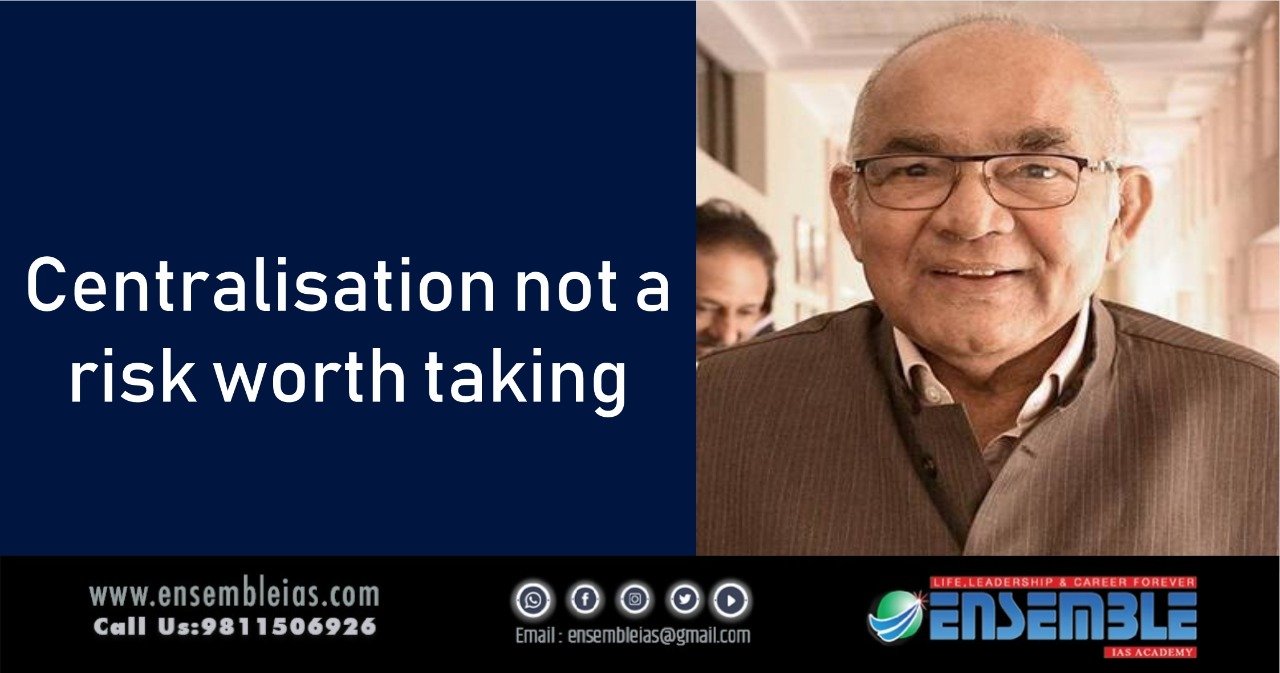Y.V. Reddy warns against tendency towards centralisation even on State subjects
Centralisation not a risk worth taking in diverse country like India: Chairman of Fourteenth Finance Commission warns
To buy our online courses: Click Here
Fourteenth Finance Commission Chairman Y.V. Reddy said on Sunday that the Centre did not support States enough at the onset of the COVID-19 pandemic, resorting to “burden-sharing” instead, and questioned the move to abandon the existing inoculation system of the Centre providing free vaccines and States using their resources to deliver the shots.
Warning against a growing tendency towards centralisation even on State subjects under the Constitution, Dr. Reddy said the idea of different development models adopted by States is no longer on the table under the Narendra Modi government and there is a worrying asymmetry between the responsibilities of States and the resources available to them.
“There is an impression gained that the Central government feels it can do a better job in regard to various activities even if they are in the State list. On fiscal federalism too, the Fifteenth Finance Commission recommendations were accepted but not fully implemented and its terms of references were controversial,” he said, adding that States’ borrowing limits have also been made conditional which is a “real problem”.
“There is a rebalancing going on between the State and the market and also between the Centre and States in India, but in the process of rebalancing, we should not underestimate the strong sub-national sentiment within loyalty to the country,” he averred in a talk on Centre-State relations hosted by the Manthan Foundation.
The United Progressive Alliance (UPA) government’s decade in office saw the emergence of different development models among States, as their governance capabilities matured and policies unique to their needs were adopted, Dr. Reddy recalled.
“Prime Minister Narendra Modi, however, has been able to project a national agenda, and the idea of different States having different models is not very much on the table now. And there are some tensions also,” he said, stressing that pressures and tensions between the Centre and States may be counterproductive.
He said some of the measures being pursued by the government, such as One Nation, One Election, which proceed on the belief that a centralised system is better, are questionable.
“In particular, with the elections, it will be problematic. But overall, the basic problem is centralisation in a diverse country can produce risks which are not worth taking,” he said, stressing that the underlying logic for India’s federal structure is to recognise the diversity of States in order to strengthen national unity.
“When fiscal space is given to the Centre, it is used for performing States’ functions rather than increase the allocation to defence. Even when the electorate votes for a strong Centre, they want a strong Centre to perform strongly on defence, external affairs and national issues, not to perform State governments’ functions,” he said.
“Even the impression that the electorate is wanting a strong Centre to perform State functions is not valid, if you see in most of the recent State elections with the BJP not doing so well. In a way, there’s discontent about the way the Centre is handling States. I think the strong Centre is good, but a strong Centre should take care of the national problems vis-a-vis the global situation,” he said.
Arguing that Niti Aayog, which recently established a governing Council with States on board, has not been able to replace the Planning Commission as a useful forum for Central-State dialogue, Dr. Reddy said there was a national ‘vacuum’ in institutional mechanisms for the PM to meet Chief Ministers. The anti-defection law, he pointed out, also made it difficult for Rajya Sabha MPs to represent their States’ interests.
Even in the Goods and Services Tax (GST) Council, the Union government has more say than the States, though in terms of relative powers, the States gave up a lot more autonomy than the Centre, the former Reserve Bank of India Governor emphasised.
On the disquiet over the COVID-19 vaccination policy, Dr. Reddy said the division of labour was clear in the past, with the States deploying their administrative machinery and local knowledge to deliver vaccines provided by the Centre for free. “Whether this model was better or not and what are the reasons this model was changed, is a question mark,” he remarked.
“When COVID was recognised as a serious national issue, whenever there is a serious crisis of that nature, the Central government has to support the States as it is done all over the world because they don’t have resource flexibility. In this particular instance, there is an impression of burden-sharing,” he said.
The Centre’s stressed fiscal position even before the pandemic’s onset may have led to initial discomfort about supporting States to the extent required, but subsequently, it has been trying to extend support to them, Dr. Reddy said. “The Centre was a little more conscious of its own fiscal position and underestimating the burden on the States in the beginning stages. Perhaps, it realised the challenge is too much,” he noted.
On the regulation of minor ports or cooperatives where the Centre is moving into States’ domain, it would be better for Bharatiya Janata Party-ruled States to implement them first, while privatisation and airport sales should factor in States’ contributions in ventures such as free land and compensate them, Dr. Reddy said.




